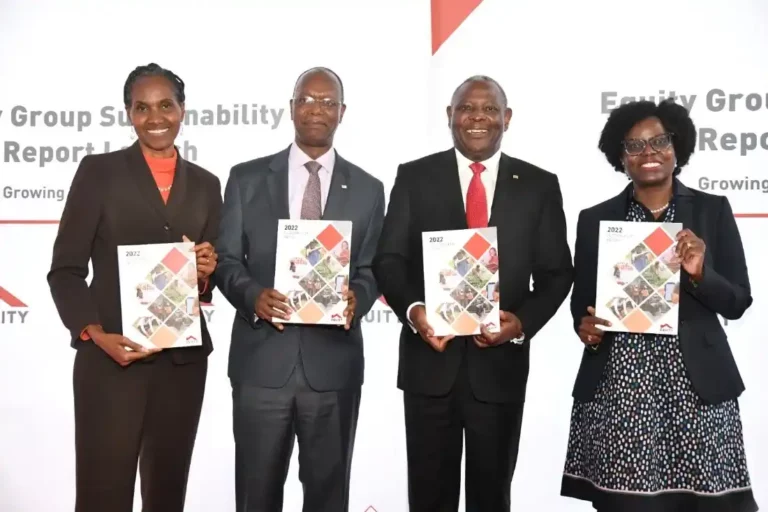Equity Group considers diversity as a strategic imperative, providing a range of skills, knowledge, experience, and backgrounds that enrich the team.
Equity is leveraging the power of diversity within its portfolio of countries and building diversity agendas, especially on gender, race, and languages, into its recruitment and development processes.
Gender diversity is core to the Group’s Diversity, Equality, and Inclusion (DEI) approach. The Group tracks diversity in the workplace by collating data on gender and people with disabilities.
This is according to its annual Sustainability Report for 2022, themed “Growing Together in Trust.”
The report highlights Equity’s commitment to sustainable business practices and the integration of Environmental, Social, and Governance (ESG) aspirations into its operations.
The report adheres to the Global Reporting Initiative (GRI) and Taskforce for Climate-Related Financial Disclosure (TCFD) guidelines, showcasing Equity’s commitment to transparent sustainability and impact reporting.
“I am pleased to share that Equity Group’s dedication to diversity, equality, and inclusion is unwavering. Empowering and capacitating women is deeply ingrained in our organizational DNA.
Our Board of Directors comprises a commendable 33 per cent female representation, aligned with gender parity benchmarks set by developed economies,” Equity Group Managing Director and CEO, Dr. James Mwangi, said.
“Moreover, we take immense pride in the notable 48 per cent female representation across all Group and subsidiary board committees, underscoring our firm commitment to fostering equitable opportunities at every echelon of our organization.”
— Equity Bank Kenya (@KeEquityBank) July 25, 2023
Board Membership
A third of the Board of Directors are women, matching the benchmark set in developed economies for gender parity.
In 2022, the Group saw an increase in the number of women in both management and senior management positions.
The Group has set a target of 41.7% of senior management being women and continues to work towards this. 44.5% of the workforce across the Group is female.
In 2022, the Group continued to implement training and leadership programs to empower women, with a specific focus on empowering women in management roles.
These initiatives leverage existing platforms in place through the Group’s ‘EQUIP’ leadership program.
The Group has achieved 48% female representation across all board committees, with five committees achieving 50% female representation.
Addressing Pay Parity
Across the organization, men still get paid more than women in the same position, though this has seen a shift over the last four years.
“The DRC has significantly improved pay parity, with almost a one-on-one pay parity ratio achieved with a discrepancy of only 13 per cent noted by the end of 2022,” the lender stated in the report.
“South Sudan continues to exceed expectations in their efforts to address pay parity with the ratio reducing by 11 per cent from 2021 to 2022.”
Rwanda saw the biggest shift year on year, with a 111% improvement and a pay parity ratio of 1:1.22 (female to male pay) in 2022.
In 2022, Equity recorded a 1:0.01 (1%:41%) ratio of the annual total compensation for the organization’s highest-paid individual to the median annual total compensation for all employees (excluding the highest-paid individual).
The Group continues to work closely with its subsidiaries to ensure the implementation and ongoing monitoring of the remuneration policy and requires subsidiaries to conduct ongoing salary reviews to track progress in addressing pay gaps.
“Kenya and Uganda reported an increase in the disparity in pay between the genders. This will be closely monitored for all countries of operations to ensure the pay parity continues to improve across the group. The group also requires subsidiaries to conduct ongoing salary reviews to track the progress being made to address these pay gaps.”
— Equity Bank Kenya (@KeEquityBank) July 25, 2023
Equity Group Reports 31% Increase in Employee Base
The Group reported a 31 per cent increase in its total employee base in 2022. The largest increase in employee numbers was noted in Kenya, with a 65 per cent increase from 2021, followed by the DRC with a 13 per cent increase from 2021.
“The Group has a significant employee base and is able to attract the talent Equity needs in their operations, driven by the progressive organisational culture, and by being known as an employer who empowers and builds the required capacity for its employees.”
In 2022, the number of permanent and temporary employees increased by 31 per cent year-over-year to 13,065, while the number of contract and temporary employees increased by 93 per cent year-over-year to 4,839.
Employee turnover was at 12per cent, and 3.4 per cent of total employees were covered by collective bargaining agreements, a 1.4 per cent increase from the previous year. A total of 346 women and 356 men took parental leave, with all returning to work.
The Group said it is strengthening its capabilities to extend employee benefits across its footprint by ensuring legislative requirements are met and by steadily rolling out additional benefits to its remaining subsidiaries.
Chairperson Equity Group Board Sustainability Committee, Dr Helen Gichohi further said, “As the world confronts sustainability challenges, there’s pressure for organizations such as Equity to articulate and demonstrate the role we are playing to address these challenges and to become and prioritize sustainability.”
As the world confronts sustainability challenges, there’s pressure for organizations such as Equity to articulate and demonstrate the role we are playing to address these challenges. – Dr. Helen Gichohi
Chair, Sustainability Board Committee, Equity Group. pic.twitter.com/d0wrEcfvBn— Equity Bank Kenya (@KeEquityBank) July 24, 2023




